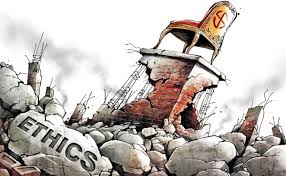Widgetized Section
Go to Admin » Appearance » Widgets » and move Gabfire Widget: Social into that MastheadOverlay zone
Are Group Ethics Determined by Political Necessity?
The views expressed are those of the author and do not necessarily reflect the views of ASPA as an organization.
By Eric Devore
June 10, 2024

Ethics in government is important and has been for millennia, at least as far back as the ancient Greek philosophers Aristotle, Plato and Socrates, among others. For a government, as an organization, to be ethical, it must be made up of and run by ethical individuals. According to Socrates, the Father of Ethics, eternal truths are not relative but universal and not subject to shifting and changing subjective opinions. What is right is and always will be right, and what is wrong is wrong. These ethics are the same for all people, for all ages. With government, universal ethics are for the good of the whole people, not just the individual or group within society.
In his book, “Moral Man and Immoral Society: A Study in Ethics and Politics” (2013), Reinhold Niebuhr states, “Every group, as every individual, has expansive desires which are rooted in the instinct of survival and soon extend beyond it. The will-to-live becomes the will-to-power.” Groups, including governments, use various tactics to gain support for its morally questionable decisions. One of the more popular tactics used is invoking patriotism.
There was a time in this nation’s history when many considered it the “police of the world,” stepping in to fight injustices for people in less advanced countries. In recent history, the United States has a demonstrated history of not engaging in armed conflicts in other countries unless there is something politically or financially to be gained from it or if forced by preexisting treaties. As we have seen time and again in just the last three decades with acts of genocide, particularly on the African continent. While mass ethnic cleansing went on, the government of this country looked the other way, like it was not happening.
When the United States does get involved, it is for political power or wealth. Vietnam is a classic example of taking action for political power in an attempt to stop the spread of Communism. In Kuwait, it was about oil. Later, in Iraq, the government invoked patriotism in claiming weapons of mass destruction existed, but it was really about oil. The country must have minerals or precious metals that can be exploited or if it can be used as a foothold for future strategic military staging.
The Manhattan Project, which effectively began the Cold War with the development of the atomic bomb, culminated with the decision by President Harry Truman and our government to use nuclear weapons on Japan, becoming the first, and only, country in history to use atomic weapons on a civilian population. The bombing of Hiroshima and Nagasaki caused devastating destruction and the loss of hundreds of thousands of innocent lives. While some would argue that it was justified by Japan’s surprise attack on Pearl Harbor, the reality is that the lives lost there were military, not civilian. Others would argue that the use of atomic weapons was justified to bring an end to the war and the ever-growing loss of soldiers on both sides.
While the loss of any life is tragic, the only loss of life in war should be of soldiers, not civilians. By most accounts, the Japanese were close to surrendering before the bombs were dropped. Therefore, the use of atomic weapons was not warranted. The only objective justification for dropping those bombs was political power—to show the world how advanced the United States had become in the arms race. At the conclusion of World War II, Truman continued on his path of questionable ethics with Operation Paperclip. To further escalate the Cold War, our government secretly brought in scientists and engineers from Nazi Germany to “beat the Russians into space.” Many of them were leaders within the Nazi party and, therefore, war criminals.
The ethics demonstrated by these decisions are questionable at best; at worst, they are criminal. These are not the ethics of Socrates but of the Sophists, as they are relative rather than universal, and they can be changed to suit the needs of the government.
Conclusion
So, if governments are made up of ethical individuals, how then does a government make unethical decisions? Perhaps Niebuhr was right when he theorized that individuals who appear moral and ethical in their personal lives can hide behind the group when immoral actions are taken “with oppressive ruthlessness, and with devastating destruction.” As we have seen, the government of this nation does, time and again, act in its own self-interest of wealth and security. The United States government rationalized some of the greatest atrocities in history on utilitarian grounds, arguing that the ends justified the means. It would seem then that the group ethics of government is determined by political necessity.
Author: Eric DeVore has a Master of Public Administration from California Baptist University in Southern California. He is currently in the DPA program at CBU. He has served the public for over 16 years with the Riverside County Sheriff’s Department. Initially, he worked in crime scene investigations with their forensics unit. He is currently a deputy coroner with the Department, conducting death investigations. Email: [email protected]



 (3 votes, average: 3.33 out of 5)
(3 votes, average: 3.33 out of 5)
Monica Alford
July 18, 2024 at 5:44 pm
I enjoyed reading this Eric! Packed with historical connection and straightforward in tone as is the author himself !